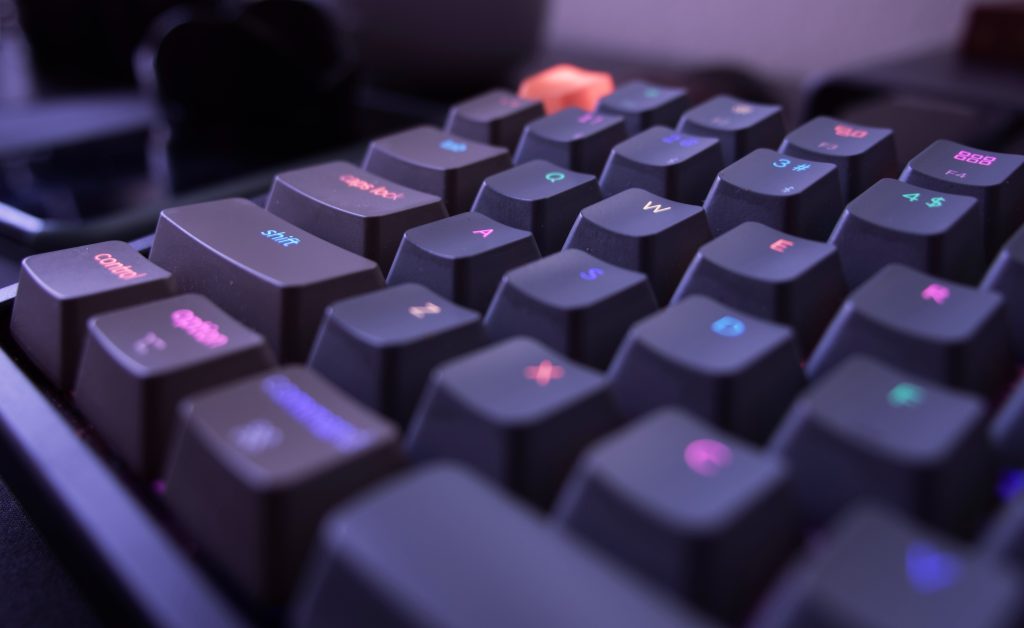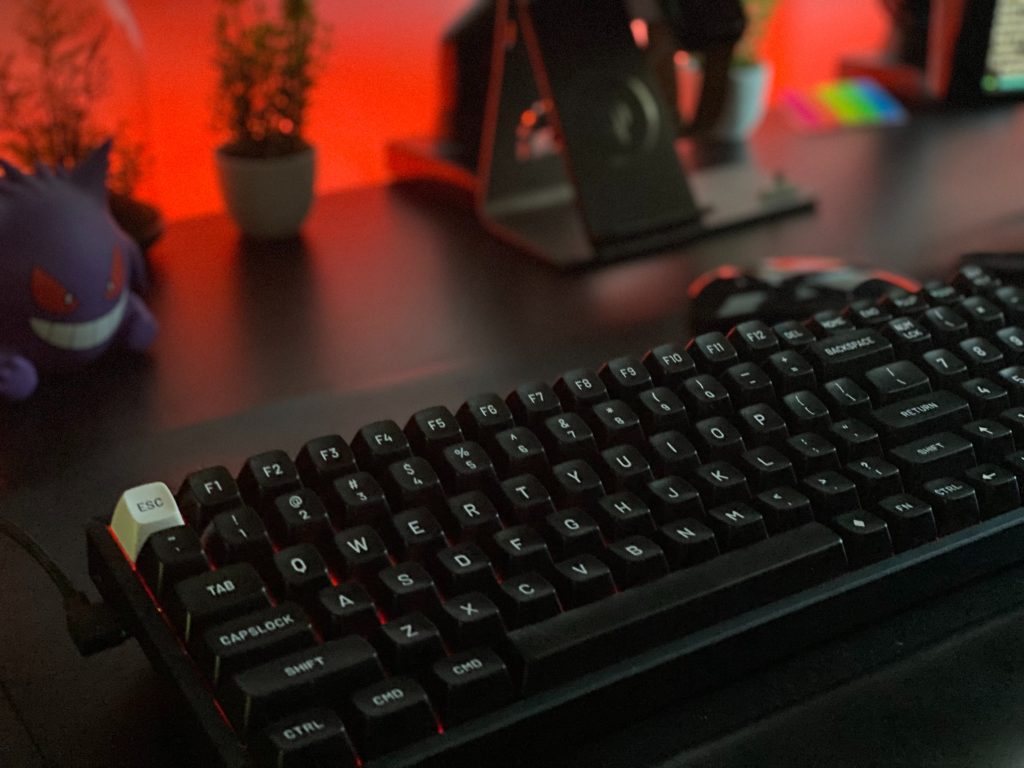Alright, keyboard enthusiasts and curious minds, let’s dive into one of the most heated debates in the computer peripherals world. You’ve likely heard both sides: “Mechanical keyboards are the speed champions!” or “No, membrane rules!” But what’s the real scoop? Are mechanical keyboards genuinely faster than their membrane counterparts?
The Roots of the Debate
First, a brief history lesson. The “mechanical vs. membrane” showdown isn’t a new one. Ever since the advent of the personal computer, there’s been a constant tussle between innovations and tried-and-tested technologies. But as much as history is fascinating, let’s cut to the chase.

How Do Mechanical Keyboards Work?
Mechanical keyboards operate on individual switches for each key. These can be linear (straight up and down action), tactile (you feel a bump as the key is pressed), or clicky (tactile with an added audible click sound). The key advantage? Consistency and feedback. A gamer might tell you, “It’s about knowing when the key registers. I can feel it.” A typist might say, “It’s about the rhythm and the confidence in each press.”
And Membrane Keyboards?
Now, these guys operate a bit differently. Membrane keyboards work by running an electrical current through two plastic membranes. Press a key, the membranes touch, and voilà! The key registers. They’re generally quieter, often thinner, and usually more affordable. But they might lack that tactile feedback that mechanical keyboard lovers rave about.
Mechanical Keyboards vs. Membrane: The Speed Test
Alright, let’s get down to the real business. Are mechanical keyboards faster? When you press a key on a mechanical keyboard, the feedback and the actuation (the point where the keypress registers) can be felt more distinctly. This can lead to quicker successive key presses and potentially faster typing or response in gaming scenarios. In contrast, membrane keyboards might require a full press down, potentially slowing things down by milliseconds.
Now, to the everyday typist or casual gamer, these milliseconds might not make a noticeable difference. But for a professional e-sports player or a programmer on a tight deadline, these milliseconds can add up.
Tactile Feedback Comparison
We can’t stress enough how much tactile feedback plays a role. Mechanical switch types, one of our suggested keywords, makes a huge difference. The tactile feedback in mechanical keyboards allows for faster “rollover” or moving from one key to the next. It’s like a seasoned pianist gliding over the piano keys.
Membrane keyboards, while they have their merits, might not offer the same rollover speed due to the lack of tactile feedback. Some users might find themselves pressing harder or waiting to ensure the key is registered, leading to those slight delays.
Gaming Keyboard Performance
For the gamers out there, gaming keyboard performance is paramount. In high-stakes situations where every millisecond counts, the actuation speed of your keys can be a game-changer. Mechanical keyboards, with their clear tactile feedback and faster actuation, often have the upper hand in these scenarios.
Durability: Mechanical vs. Membrane
Speed isn’t just about how fast the key registers; it’s also about longevity. A keyboard that starts to degrade after extensive use might become slower over time. Mechanical keyboards are often touted for their durability, with some switches rated for tens of millions of keystrokes.
While membrane keyboards can also last a long time, they might degrade faster with heavy use. Over time, the membranes can wear out, leading to slower actuation or missed keystrokes.
Comparative Analysis: Mechanical vs. Membrane Keyboards
This heading encapsulates the essence of the table, which contrasts the features and characteristics of the two keyboard types.
| Aspect | Mechanical Keyboards | Membrane Keyboards |
|---|---|---|
| Operating Mechanism | Individual switches for each key | Electrical current between two plastic membranes |
| Tactile Feedback | High (varies with switch type) | Low to Moderate |
| Actuation Speed | Faster due to clear tactile feedback | Slightly slower; might require full press |
| Sound | Audible click (depends on switch type) | Generally quieter |
| Durability | Often longer-lasting with some switches rated for tens of millions of keystrokes | Good, but may degrade faster with heavy use |
| Price | Generally more expensive | More affordable |
| Customizability | High (keycaps, switches, and lighting) | Low to Moderate |
Additional Points of Consideration
When deciding between mechanical and membrane keyboards, there are other factors to consider. For instance, while mechanical keyboards offer a variety of switch types like Cherry MX Red, Blue, Brown, and others, membrane keyboards don’t provide this level of customization. This switch variety in mechanical keyboards allows users to further fine-tune their typing experience.
Furthermore, the aesthetics and customizability of mechanical keyboards are often more extensive. From RGB lighting to custom keycaps, mechanical keyboard enthusiasts have a myriad of options to personalize their devices.

Ease of Maintenance
Mechanical keyboards, with their individual key switches and removable keycaps, are often easier to clean and maintain. A regular shake-down, air blow, or even a keycap removal session can get rid of the crumbs and dust.
On the other hand, membrane keyboards might be trickier to clean thoroughly. Given the membrane layer, there’s less room to navigate and get rid of any pesky particles that find their way beneath the keys.
Which One Should You Choose?
The debate rages on. Some might argue that the speed and tactile advantages of mechanical keyboards make them the undisputed winners. Others might vouch for the quieter, more affordable membrane keyboards.
If speed, customization, and tactile feedback rank high on your list, a mechanical keyboard might be your best bet. However, if you’re looking for a more budget-friendly, quieter option for casual use, membrane keyboards have got your back.
Remember, it’s not about jumping on the bandwagon. It’s about finding the right fit for your needs. So, test, type, game, and decide for yourself!
Conclusion:
In the mechanical versus membrane keyboard debate, mechanicals boast distinct tactile feedback, swift actuation, and impressive durability. Their unique switches and customization options make them a favorite among enthusiasts. Conversely, membrane keyboards offer a quieter, more affordable typing solution with respectable performance.
While they might not offer the precise tactile feedback of their mechanical counterparts, they hold their ground in everyday tasks. When choosing, consider factors like speed, feedback, price, and purpose. Ultimately, the best keyboard harmoniously complements your typing or gaming style, balancing performance with personal preference. Dive deep, explore, and pick what resonates with your needs.
FAQs
- What’s the main difference between mechanical and membrane keyboards?
- Mechanical keyboards operate with individual switches for each key, offering distinct tactile feedback. Membrane keyboards work by running an electrical current through two plastic membranes, usually providing a softer, quieter keypress.
- Are mechanical keyboards truly faster than membrane keyboards?
- In terms of actuation and tactile response, mechanical keyboards tend to be faster. However, for everyday tasks, many users might not notice a significant difference.
- Is one type of keyboard more durable than the other?
- Mechanical keyboards often have a longer lifespan, with some switches rated for tens of millions of keystrokes. Membrane keyboards are durable but might degrade faster with heavy use.
- Why are mechanical keyboards generally more expensive?
- The complexity of their design, individual switch mechanism, customization options, and often more robust build materials contribute to their higher cost.
- Are membrane keyboards always quieter than mechanical ones?
- Generally, yes. While some silent or soft-touch mechanical switches exist, membrane keyboards are typically quieter due to their design.

Experience is what matters at the end!!
Hi! This is Jacob Jay – founder of Keyboardgear.com! From childhood to adulthood, I’ve always remained passionate about IT, and the revolution in this industry, especially gaming on the PC can’t go out of my way. Since I’m an enthusiastic gamer, and I love to experience various gaming accessories, particularly mechanical keyboards, that really boost my gaming adventure manifolds. So, my nerve cells hit me to transfer my experiences into word form and share with others to identify the ideal keyboards perfectly fit for their gaming modes.
I know very well how hard it is to find the high-quality items available on the internet that ought to be exactly the same as seen as on the screen. But the counterfeiters have ruined the user’s trust. As I have passed all such situations, I’m obliged to deliver the genuinity and express the same as what I am saying.
So, now, I’m working on the mission to provide very helpful and frankly but trustworthy reviews and guides about various mechanical keyboards, mouses, and other gaming accessories as per my personal experiences and sound knowledge.
